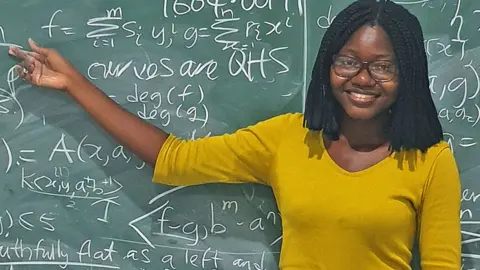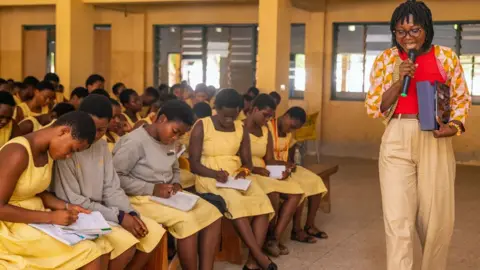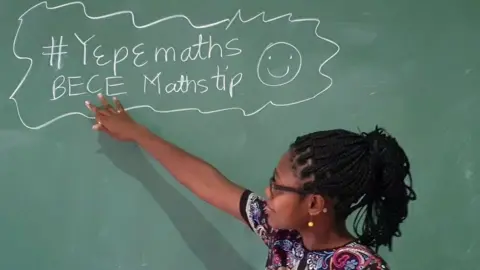[ad_1]
 Angela Tabiri
Angela TabiriRecognized in Ghana because the Maths Queen, Dr Angela Tabiri is the primary African to win The Huge Web Math Off competitors – fairly an achievement for somebody who had not initially deliberate to check arithmetic.
The 35-year-old Ghanaian “finds pleasure in fixing puzzles and mathematical questions” and hopes her 2024 win will open up the world of arithmetic to different African girls – who’ve historically been discouraged from taking the topic.
Sixteen mathematicians had been invited to compete for the tongue-in-cheek title of “the world’s most fascinating mathematician” – a public vote occasion began in 2018 by The Aperiodical weblog.
The primary winner was Dr Nira Chamberlain, the primary black mathematician to be included within the British reference e-book Who’s Who and a vice-president of the skilled physique, the Institute of Arithmetic and its Purposes.
Throughout the occasion all of them compete in opposition to one another – so two in every match – after which it goes to quarter-finals and semi-finals till the large match to resolve who has defined their chosen mathematical idea in probably the most illuminating approach.
Dr Tabiri’s ardour is quantum, or non-commutative, algebra, which she researches on the Ghana department of the African Institute for Mathematical Sciences (Goals).
Goals began in South Africa after which expanded to Ghana, Senegal, Cameroon and Rwanda – to supply post-graduate coaching and analysis in science, expertise, engineering and arithmetic.
Dr Tabiri can be the tutorial supervisor for the Women in Mathematical Sciences Programme, a mentoring and assist scheme for prime or secondary college ladies in Ghana.
It was arrange by Goals Ghana in 2020 to “make sure that we now have a pipeline of younger ladies who shall be main in analysis and innovation within the mathematical sciences – in academia and in addition business”.
 Angela Tabiri
Angela TabiriDr Tabiri says the numbers of ladies and boys learning maths at highschool is roughly equal however then drops off at college degree.
That is partly as a result of, she says, feminine college students assume is that in the event that they do maths, the one job they’ll do is train, as a result of maths remains to be seen as a “boy’s topic” – and there are only a few feminine function fashions.
That is one thing Dr Tabiri is making an attempt to alter.
However her journey into maths was not easy.
She grew up in Ashaiman, one of many poorer, densely populated neighbourhoods of Tema, an industrial hub and port an hour’s drive east of the capital, Accra.
Her household house was completely satisfied however noisy – she has 5 sisters – and Dr Tabiri would typically search out the peace and quiet of the native youth group centre in order that she might examine.
She wished to comply with within the footsteps of two sisters and examine enterprise administration at college.
However her grades, though excessive, weren’t excessive sufficient – and so she was accepted as an alternative for arithmetic and economics.
“It was a blessing in disguise,” Dr Tabiri says. “Numbers and puzzles fascinated me – however I by no means thought a profession in maths was for me.”
In 2015, Dr Tabiri obtained a scholarship to do her PhD at Glasgow College in Scotland. It was onerous work, she says – and it was there that she skilled a seminal second.
She went to see Hidden Figures, the movie about black American girls mathematicians who labored on the US house company, Nasa, within the Nineteen Fifties, in the course of the period of segregation within the US.
“It was wonderful seeing the story of those black girls advised on that world stage,” she remembers. “I had a number of goose bumps watching it.”
She was significantly impressed by Katherine Johnson, whose extraordinary mathematical abilities and calculations had been so essential to the success of US house flights.
“Katherine Johnson labored so onerous – and for a very long time her work was hidden. She made me realise that I simply need to hold going.
“In case your work shouldn’t be even recognised now, it will likely be recognised someday in future. It was an actual turning-point for me.”
Ghana reached an historic milestone in 2024 when Dr Gloria Botchway grew to become the primary lady to graduate from the College of Ghana with a PhD in maths.
It was a journey filled with hardships – together with promoting water and yams on the roadside as a six-year-old.
Dr Tabiri is making an attempt to assist different African women and girls from much less privileged backgrounds to comply with their maths desires by her FemAfricMaths non-profit organisation.
Together with different volunteers, she offers classes to the youngest high-school college students in individual and on-line.
She additionally posts on social media interviews she does with main feminine mathematicians from all around the world.
Dr Tabiri can be vastly passionate in regards to the potential of quantum science and expertise – for which arithmetic is important.
She is proud that Ghana, backed by Mexico, spearheaded proposals that 2025 be declared the UN Worldwide Yr of Quantum Science and Expertise – on the one centesimal anniversary of the invention of contemporary quantum mechanics.
Quantum mechanics emerged from research to uncover how ultra-tiny particles – probably the most basic bits of matter, vitality and light-weight – work together with one another to make up the world.
It led to the event of the web, photo voltaic cells, and world navigation satellite tv for pc programs.
Researchers and massive tech corporations from internationally – together with China, the US, the UK, Australia and South Africa – are actually racing to develop quantum applied sciences, together with quantum computer systems and ultra-precise measuring and sensor gadgets.
The hope is that complicated issues shall be solved at lightning speeds – and there shall be big improvements in areas like drugs, environmental sciences, meals manufacturing and cyber-security.
“There are many conversations now – the benefits and downsides – the roles that shall be created,” says Dr Tabiri.
 Angela Tabiri
Angela TabiriAfrica’s fast-growing inhabitants, already the youngest on this planet, would be the world’s largest workforce by 2040, in response to the UN.
“However that does not imply that we are going to get the roles,” says Dr Tabiri.
She hopes to organise a “quantum highway present” as a primary step in introducing schoolchildren to quantum science at a a lot earlier age that she was.
“We would like younger individuals to begin creating an curiosity in and constructing all of the related abilities throughout their fundamental education,” she says.
The highway present shall be based mostly on a latest quantum computing course she helped organise for secondary-school ladies who attend courses at Goals Ghana throughout their holidays.
The course mentioned what it takes to construct a quantum laptop, its present fragilities – and the challenges quantum computing poses to present programs, reminiscent of cryptography.
Working with Unesco, Dr Tabiri will even host a week-long “Quantum Hackathon” in July at Goals-Ghana for about 40 post-graduate college students from completely different African international locations.
“We would like them to make use of their quantum abilities to unravel a number of the best challenges that we face, real-life issues,” says Dr Tabiri.
“It’s totally pressing that we place our youth for this subsequent huge revolution.”
You may additionally be desirous about:
 Getty Photographs/PJDM
Getty Photographs/PJDM[ad_2]
[ad_1]
#Ghanas #Angela #Tabiri #Maths #Queen #quantum #mission #mentor #ladies
[ad_2]
, 2025-01-11 00:30:00




